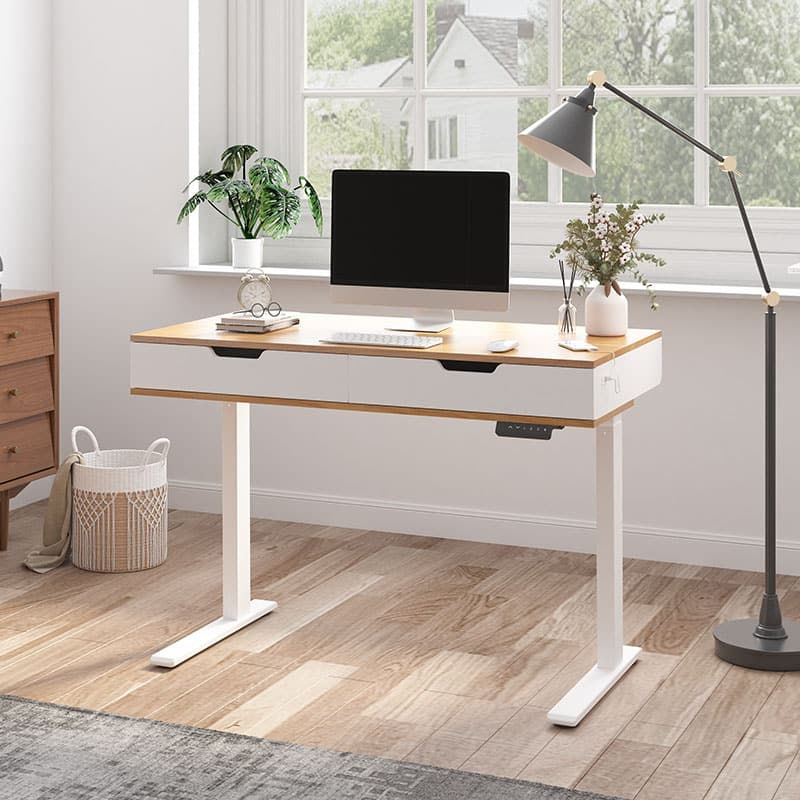Whether you’re working from home or within an office, the act of sitting at a desk and staring at a computer screen for hours on end is profoundly unnatural for the human body. While it would be great to be active all day, walking through forests or playing by the beach, unfortunately for modern humans with jobs that's nigh on impossible.
Our bodies are creaking badly as a result of being in these unnatural positions for hours and statistics relating to back, neck and shoulder pain have become alarming. Roughly 1 in 6 people currently experience back pain in the UK, while a whopping 80% will experience back troubles at some point in their lives.
But it need not be all doom and gloom. While it’s unlikely we’ll see sweeping changes to how we work anytime soon, there are several things you can do to keep your body healthy during the working day.
Equipment
It goes without saying but a top-quality ergonomic minded chair is an absolute must, a fact that became painfully clear to many while working from home during the Covid-19 Pandemic. It doesn’t take long after moving from a high-end chair and desk to a rickety kitchen stool to see how important it is to use the best quality equipment around.
If you want to try something a little different, sitting on an exercise ball has been shown to really work your abs and back muscles while improving your overall posture. Then we have perhaps the ‘pièce de résistance’ of active office life, the treadmill desk. This will undoubtedly take some time to get used but the act of slowly walking throughout the day while getting all of your work done will do wonders for your body.
Stretching
Perhaps the most obvious on our list is also one that is also all too frequently overlooked. Most of our back, neck and shoulder issues come from us sitting for hours in a position our bodies were never designed for. Simply doing five minutes of stretches while standing up every 30 minutes will be hugely beneficial for your body.
There are also many stretches that you can even do while seated that are sure to stretch out those aching muscles during the day. Here are 10 stretches to get you going but in the long run, it’s always best to tailor your own work-day stretching routine. When you arrive at home at the end of the day, be aware of which parts of the body are sore and look up some specific stretches for those areas.
Sitting/Standing/Sitting

Standing desks are becoming increasingly popular these days and are also an excellent way to burn some extra calories while continuing to work. If you find the idea of standing for the entire working day exhausting before you even start, why not start small. Switching back and forth from sitting to standing every 30 minutes, or even simply taking phone calls standing, will be enough to produce some noticeable changes. For more information on the benefits of standing, check our blog post 10 Health Benefits That a Standing Desk Can Bring You.
Eyes
It’s easy to focus simply on that dull ache at the bottom of your spine but if you are staring at a computer screen all day you are almost certainly damaging your eyes. However, there are several actions you can take to mitigate this. When staring at a computer screen for long periods, we tend to blink much less than we normally do, which contributes to dry eyes. Blinking is such an automatic action it might be difficult to get into the habit of forcing yourself to do it more, but it will certainly help with retaining the right level of moisture in your eyes.
The 20/20/20 rule is a great technique to apply in the office and requires you to look at something at least 20 ft away for 20 seconds for every 20 minutes that you’re staring at a computer screen. To help you keep track you can set a silent repeated alarm on your phone that will flash up every 20 minutes.
In terms of equipment, you can reduce the glare from your computer screen or even enlarge the type size for easier reading. Also, think about the lighting in the room that you’re working in. It may sound counter-productive, but less light can often be better for your eyes. Bright fluorescent lights above or behind you are generally quite harsh, which forces the eyes to strain above and beyond their natural capacity. That’s not to say you should be working in the dark, but softer light above or to the side of you is always preferable.
Exercise
It is of course near impossible to properly exercise while working - although a treadmill desk is certainly a good place to start - but that doesn't mean that you can’t find some time for it. Simply doing 30 minutes of vigorous exercise every day will greatly improve how your body feels throughout the working day.
Sometimes it can be difficult to find the available time but the trade-off is certainly worth it. Exercising before or after work is an option if you can, while some choose to use their lunch break or even take to walking, jogging or cycling to and from work.
When it comes to the best form of exercise there’s plenty to choose from. Activities like yoga and pilates are excellent at giving the body a full-bloodied stretch, while CrossFit and swimming are two others that require a little more energy. In reality, any kind of exercise done on a working day will bring plenty of benefits, so find something you love and get moving - your body will thank you for it.